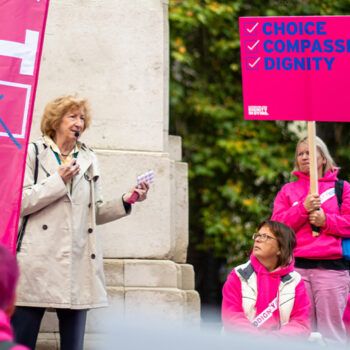Baroness Meacher’s Assisted Dying Bill (2021)
Dignity in Dying's Chair, Baroness Meacher, introduced a bill to permit assisted dying for terminally ill, mentally competent adults in 2021.
The Assisted Dying Bill, a Private Members’ bill, was formally introduced by Baroness Meacher in May 2021. It intended to legalise assisted dying as a choice for terminally ill, mentally competent adults in their final months of life.
The bill required that two independent doctors and a High Court judge be satisfied that an individual making a request is over 18, terminally ill with six months or less to live and fully mentally competent, and that they are making a clear, settled decision of their own volition. A prescription for life-ending medication would then be granted, which the individual could take at a time and place of their choosing.
Key stages of the Assisted Dying Bill

The bill received its First Reading on Wednesday 26 May 2021 and was first debated at its Second reading on 22 October 2021. The bill passed this stage unopposed with a majority of speakers in favour and strong cross party support, including from Lord Field, who revealed his terminal diagnosis, Baroness Davidson, making her maiden speech, Lord Forsyth, Baroness Warsi, Lord Hogan-Howe, Baroness Symons and Lord Lancaster among those supporting assisted dying.
The bill then passed to Committee Stage but ran out of time and was unable to pass all the necessary stages before the parliamentary session ended. The bill officially fell when the new session began, marked by the Queen’s Speech in May 2022.
Future Assisted Dying Bills
It is clear that the existing system of Private Members’ bills is not up to the challenge of dealing with the issue of assisted dying without the Government allowing time for full and fair debate. Dignity in Dying is now calling on political parties to Make Time for Assisted Dying by committing in their manifestoes to ensuring any future bill can be fully scrutinised, debated and put to a free vote in the next Parliament.
More about the debate
- Read full text of the bill that was tabled
- Read the debate recorded in Hansard
- Watch a video of the debate on YouTube